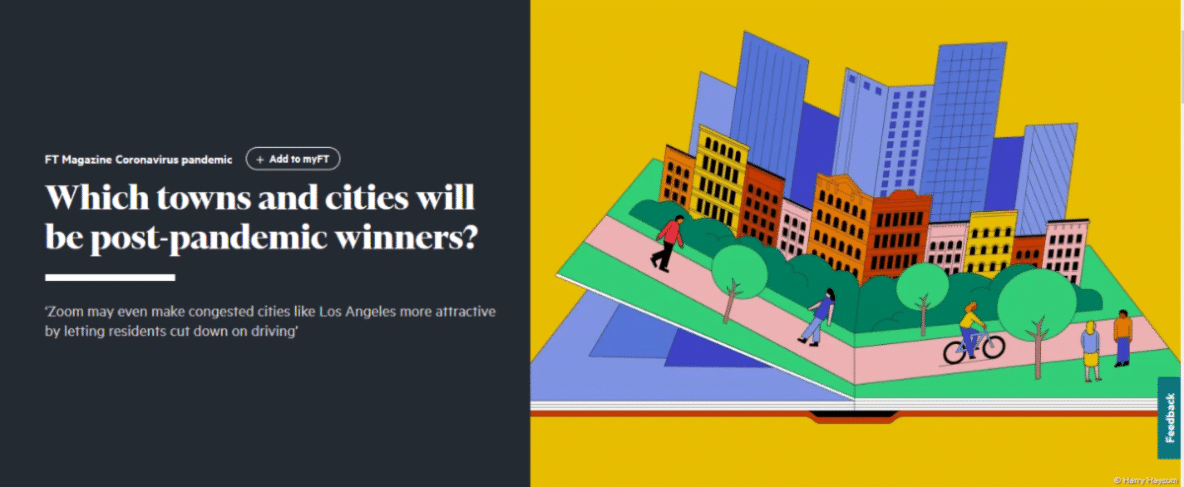Below is an article in the Financial Times on Cities Post-Covid written by Simon Kuper interviewing Richard Florida about which towns and cities will be post pandemic winners.
Richard Florida and his wife and children spent most of lockdown in their apartment on Miami Beach. When they returned home to Toronto, the city had changed. “When we left, you couldn’t get stuff readily delivered here,” he reports over Zoom. “I literally pressed the Instacart button five minutes before I connected to you and . . . (my order) will be here in half an hour.”
Florida is the urban theorist who coined the term “the creative class” and spotted its takeover of the world’s city centres. He’d barely thought about pandemics before, despite being born during the great flu outbreak of 1957 – his parents never mentioned it.
During lockdown, he read up on how pandemics change cities, and concluded that the effects were modest but real. New York, for instance, boomed after the 1918-19 flu. Florida rejects both the dystopian and utopian urban forecasts now being bandied around. He thinks cities will thrive post-coronavirus, but with younger populations than before, more housing and fewer offices and shops. He says: “It looks like about 40 per cent of the workforce is working remotely now. Maybe half of that – like 20 per cent, which is a big increase – will continue to work remotely. I think we will see carnage in the office sector.”
Florida identifies the former office workers most likely to leave cities as middle-aged people with children who have already acquired their networks, spouses and friends. Now they crave space. He’s plainly describing upscale workers – but wherever they go, the service class of baristas, hairdressers and plumbers will have to follow.
Wealthy migrants from cities may buy urban pieds-à-terre near their old offices, such as in Tribeca near Wall Street, says Florida. They will install a home office or even two in their new homes. (Their employers will be delighted to let them finance their own workspaces.) Where will these people move to? “Really nice places with a good airport and a great university, great restaurants, food shops, variety of products, ability to get good coffee, to enjoy an outdoor concert,” replies Florida. “They’re not going to go to what we thought of as barren suburban wastelands.” He adds: “I do think part of the creative class is more rural.” Amenities in second-tier US cities have transformed since about 2000. Many such places now have better independent restaurants and music venues than top-tier cities, because they have more space and fewer chains and luxury stores.
But he warns that upscale workers leaving somewhere like New York will consider only a few select locations. He cites Hudson (in upstate New York), the Hamptons and Miami. Less-blessed places will struggle in this recession: “quaint” small towns whose local universities might fold and long-term struggling cities such as Detroit that have never really gained momentum.
“I looked at the Zillow survey that compared people searching for homes in April 2020 to April 2019. Which found, on aggregate, not much change. Detroit had the greatest number of people searching for houses outside the region: a 15 per cent change.
“That worries me. I’m worried about Cleveland, Buffalo and the Akrons and Toledos. They’re lovely cities, but urban revitalisation never really took place, or was only just occurring. In America, we have this idea that many small places will rise, when in fact it’s a very small number. ” Florida considers US cities, with their relatively poor schools and long commutes, more vulnerable to exodus than, say, Toronto. Still, he doesn’t expect many departures anywhere. Zoom may even make congested cities like Los Angeles more attractive by letting some residents cut down on driving.
Florida says that if he were 23, he’d head straight for New York. He thinks the young will keep flocking to cities to have fun and make the personal connections that drive careers. He recounts asking the film director Peter Jackson how he managed to base himself in Wellington, New Zealand. Jackson replied: “I couldn’t go there to start. I had to be in LA, because that’s where the network was.” Young people will also need to spend time in offices to absorb their companies’ corporate cultures.
But some big-city office and retail space will fall empty and be converted into homes, possibly reducing urban house prices, says Florida. “London and New York won’t fall apart, but they’re going to have a price and a fiscal adjustment, so they’re going to be put under stress.
“The wave of urban protests about racial injustice, class injustice and the organisation of frontline-service workers creates a moment where it’s possible to think about a more inclusive city. But we could miss this opportunity.” That happened after the 2008 financial crisis, he notes, when gentrification only accelerated.
If Florida ran a real estate fund, where would he buy now? “My father – a guy with seventh-grade education – told me that people got rich on property in places like New York. If there’s a huge sale in New York or London and Paris, that’s where I buy.” But he doesn’t expect many buying opportunities. Great cities have overcome bigger things than coronavirus.
Richard Florida is one of the world’s leading public intellectuals on economic competitiveness, demographic trends, and cultural and technological innovation. International diplomats, government leaders, filmmakers, economic development organizations and leading Fortune 100 businesses have benefited from his global approach to problem-solving and strategy development. To invite Richard to speak at your next Virtual Meeting contact ProSpeakers.com



